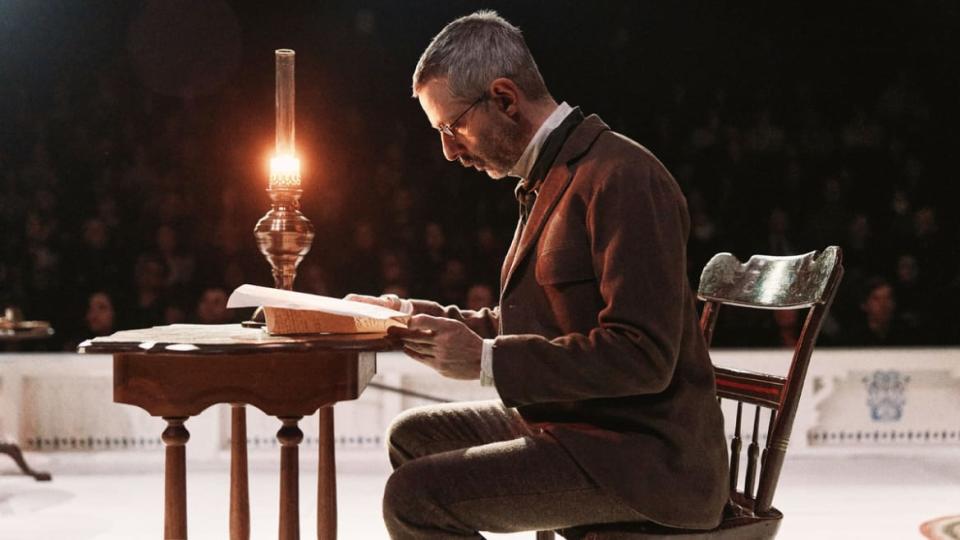In ‘An Enemy of the People,’ Jeremy Strong Finds His Way From ‘Succession’ to Broadway

It isn’t such a leap for Jeremy Strong, famed for playing Kendall Roy in Succession, to play the suddenly demonized local doctor Thomas Stockmann in Amy Herzog’s new Broadway adaptation of Ibsen’s An Enemy of the People (Circle in the Square, booking through June 16).
For one, both Succession and this adaptation, directed by Sam Gold (who is married to Herzog), know how to crunchily position drama and wit, profundity and comedy, alongside one another. This brilliant Enemy of the People is notably funny in both its smarts and pacing, and even its later gathering darkness—when Stockmann is viciously trounced and isolated by his townsfolk—is studded with light, and the certainty of his self-preservation.
Both Kendall and Thomas are both different breeds of a broader genus of black sheep—zealously attached to following their own paths, both convinced of their rightness and righteousness, and to hell with anyone who doesn’t follow them. They will court you for your support, but stay true only to their own inner compasses, moral and otherwise. Both Kendall and Stockmann are happy to be their own human islands, come what may. The tension watching An Enemy of the People is ours, rather than theirs—observing what this town’s present and future is, and its vibrating significance for the future of our own compromised, fragile democracy.
The ‘Succession’ Series Finale Proved That the Roy Siblings Are Pathetic People
The difference between Stockmann and Kendall—and this is the pleasure of watching a lean, focused Strong perform on the Circle in the Square stage—is that the wit and off-kilter feel Herzog and Gold have brought to her reimagining of the play means we see Strong’s Stockmann as a purely sympathetic, quietly insistent man of reason, desperately and futilely trying to rouse his neighbors from their fiercely embraced, rabidly expressed ignorance.
In other productions, Stockmann can be played as more of an ambiguous crusader, so wedded to the idea that the town’s water supply is poisoned without compelling evidence that his opponents worrying about the effects of his rabble-rousing on the town’s future can make sense too. That can make for a fascinating joust of beliefs and intentions. Such uncertainty, or sense of shifting positions, is missing from this adaptation.
In Herzog’s An Enemy of the People, which is still set in a small 19th century Norwegian town, those who would silence Stockmann—his brother Peter, the mayor (a wonderfully foxy, slippery Sopranos and White Lotus star Michael Imperioli, who is channeling his best Blackadder here) and Aslaksen, the printer (Thomas Jay Ryan, excellent, the most adept scene-stealer on Broadway right now)—are straight-out, double-talking, gaslighting squashers and tramplers of local democracy.
Not only do they not want to hear what Dr. Stockmann has to say, they want to cut off any means he has to say it, whether it be in the local newspaper, or in the town square itself. They are, like today’s crusading conservatives, bullies who have learned the language of victimhood to weaponize against those whose dissent and agency they are seeking to crush and destroy.

Michael Imperioli in 'An Enemy of the People.'
A wry Caleb Eberhardt gives newspaper editor Hovstad a strong, then fatally weakened, moral center—at first determined to publish Dr. Stockmann’s editorial about the town’s contaminated water supply imperiling its much-hyped new baths for the public good, and because he wants to sell copies. Then, for what he convinces himself are the same reasons, he decides against it, a small-scale example of how media independence can so quickly melt to capitulation when menaced by those who seek to silence. Matthew August Jeffers as his assistant Billing adds humor into every one of his lines and actions.
Another Succession echo: playing brothers, Imperioli and Strong lean into less the titanic battle of wills and clash of beliefs of two adults, and more the brewing and needling that only siblings can do, with all the knowledge of which buttons to push, and how one glance or word can take fraternal rivalry or just juvenile competitiveness right back to when they were kids.
How Thomas and Peter relate and mis-relate to one another has delicious echoes of Succession’s Kendall, Roman (Kieran Culkin) and Shiv (Sarah Snook) loved, hated, denigrated, protected, and provoked one another often all in the same scene. This lifelong relationship means the mayor can airily dismiss the doctor thus: “You have a deep-rooted tendency to go your own way. I was hoping you’d learned your lesson by now, learned that the common good is more important than chasing every eccentric idea that occurs to you.”
Watching helplessly, but loyally on, is Petra (Victoria Pedretti), Dr. Stockmann’s daughter, a teacher who possesses combined steel, guile, and a grief she tries to keep as inner as possible. Like Lear’s Cordelia, she both absolutely believes in her father while protective of his health and sanity, and furious at those who would diminish him and destroy his, and her, lives so wantonly. David Patrick Kelly as Morten, Dr. Stockmann’s crooked and weird father-in-law, supplies a late-in-the-game immoral quandary that feels too garbled and extraneous.
This is where being in Circle in the Square works neatly itself; performed in the round, the audience itself becomes the townspeople watching a fight between the quiet and good and small-scale boorishness and venality as if we were spectators at a prize-fight. This is why it was so tough, initially, to figure out those Extinction Rebellion NYC protesters were not part of the play, when they made themselves known at last Thursday night’s performance—and how the performers and stage staff could intervene to make their ejection into a kind of evolving sub-plotline. Their invasion, and the mood of the invented public square, bled into one another. Imperioli even told Rolling Stone he found it exciting, and stayed in character as he aided in trying to keep the production on track.

Caleb Eberhardt, left, and Victoria Pedretti in An Enemy of the People.'
The stage at Circle in the Square is designed, a little bafflingly by dots, as a kind of long train carriage, partitioned into different locations, whether Stockmann’s home or newspaper office. Sometimes it means one end of the space gets to hear the action intimately, and sometimes the other end—and, much of the time, sensibly Gold places the quarreling group as centrally as possible. The action is bookended by the singing of old Norwegian songs which, while intriguing on the ear, add an over-elaborate and needless authenticity to a play that is fully and contemporarily Anglicized.
This Enemy of the People is directly beaming into America 2024 from 19th-century Norway, playing to a hometown crowd, all too aware of truth and democracy’s fragility. The context is so acute that when Stockmann, contemplating leaving the town, mentions that America might be a better place for them, the collective sigh-meets-groan of the audience says all it needs to.
At his most pummeled and violated—literally, the townsfolk shower waste and ice upon him—we see Stockmann lying foetally covered in detritus. This again reminds you of when Kendall was left in a similar state of mentally-shattered catatonia in Succession. It looks as though both men cannot take it, but inner steel, or self-delusion—or a life-preserving mixture of both—means they shall rise again, or at least live to defy an oppressively stupid, aggressively repressive consensus another day.
Here in Herzog’s reading of Ibsen, both the doctor and Petra’s ultimate determination to stay in this town, to occupy a sliver of land they can call their own physically but also ethically, gifted by the venerable but hard-to-place Captain Horster (Alan Trong), reveals Ibsen and Herzog’s twinned belief that, whatever is done in the name of authoritarianism and denigration of self, the power of standing up—bolstered by a profoundly moral attachment to community, honesty, self-resolve, and self-respect—will always save those whom the state moves most viciously against.
The play ultimately has father and daughter planning their own school and island of decency. “We just have to imagine, that the water will be clean and safe and the truth will be valued... We just have to imagine,” Dr. Stockmann says. With those closing words, addressed direct to us, this adaptation also perhaps hopes to embolden and inspire those in the American election year of 2024 who are so far watching too silently, even complicitly, on.
Get the Daily Beast's biggest scoops and scandals delivered right to your inbox. Sign up now.
Stay informed and gain unlimited access to the Daily Beast's unmatched reporting. Subscribe now.

 Yahoo Sports
Yahoo Sports